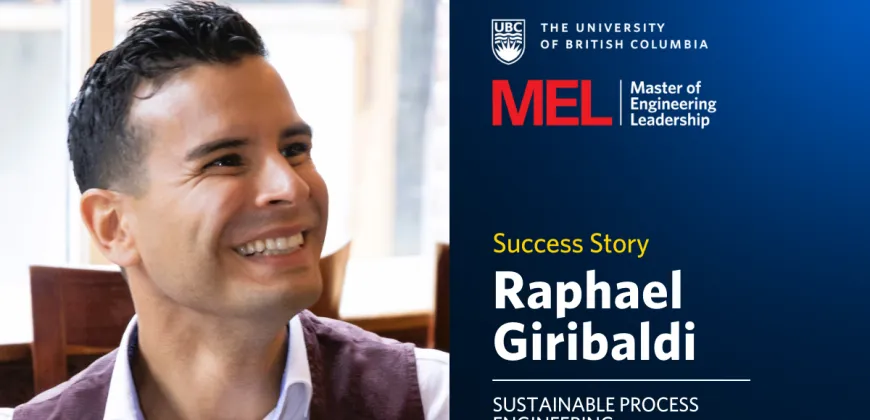Success Story: Raphael Giribaldi
Now working in the Netherlands for a startup engineering company focused on sustainability projects, Raphael Soldi is using his skills to make a difference in the world.

After graduating in 2014 from the University of Toronto with a degree in chemical engineering, Raphael Soldi joined Canadian mining company Sherritt International, working as a process engineer at a metals refinery in Madagascar for 18 months and later as a production engineer in Edmonton. He then worked for Fluor Corporation as a process engineer working with clients to optimize projects in the petrochemical industry.
Green approach to chemical engineering
“I saw the value of going back to school to refine my skills and learn about the latest technologies, and that led me to look at both one-off courses and degree programs in the realm of sustainability,” he says.
“I want to make a difference in the world, to be able to say that as an engineer I contributed to positive change. The Master of Engineering Leadership in Sustainable Process Engineering at UBC aligned with these goals, complementing my professional experience in chemical engineering and giving me a foundation from which to launch my career ambitions.”
Developing Sustainable Engineering & Business know-how
The MEL in Sustainable Process Engineering offers a wide range of engineering classes aimed at equipping students with the skills needed to develop cleaner products and processes. These include courses in reactor and processing technologies, systems design & engineering, and sustainable processes and feedstocks.
“The program demands that students have prior industry experience, and I particularly enjoyed the classes taught from a primarily industrial, non-academic lens,” says Raphael.
“Professor Naoko Ellis’ Carbon Capture, Conversion and Sequestration class and Sergio Berretta’s course on Technology Commercialization for the Manufacturing Industries also stood out as a great classes on technology development and upscaling.”
This latter course was structured around a case-study to assess the viability of a proposed industrial development project from the idea phase through to implementation.
“We evaluated the viability of launching a commercial venture to produce algae from CO2 feedstock supplied by a microbrewery as part of its production process,” explains Raphael. “We found that, while it is technically feasible, the economics of purchasing enough land to grow the algae meant that the business case just didn’t make sense in the Vancouver area where real-estate costs are so high.”
Students also take 12 credits of business and leadership classes offered through UBC Sauder’s Robert H. Lee Graduate School.
“These classes shared valuable skills for managing people, appreciating the vast scope of sustainability in business, and tying it all together,” says Raphael.
He also says that the month-long business boot camp in the summer was useful for exposing him to basic business knowledge, from learning to read financial statements to business-case development.
Ready to lead sustainability
“I wanted to pursue a career more directly related to sustainability, and was keen to live and work in Europe,” explains Raphael.
He jumped at the opportunity to apply for a position at Netherlands-based ChemXPro, a specialized consulting company that provides technological expertise in chemical manufacturing and R&D.
He flew to Amsterdam for an interview in late November 2021 – while in the midst of final assignments – and was hired before finishing his degree.
Raphael is now living in Delft and currently working with a client to develop waste-to-chemicals technology. “Conventional recycling is not economically feasible, and quality degrades over time,” he says.
“We’re using chemical recycling processes to break down molecules and begin again from scratch to create a circular system that reduces waste and eliminates the need to mine raw materials.”
He says that the MEL refreshed his technical skills and gave him an appreciation for the scope of the sustainability challenge.
“I’m working for a startup where I am looking at more aspects of the business than I had been in my earlier professional roles – not just the technical side of things, but also finance and economics. The MEL was a good motivator in getting me to where I am now.”